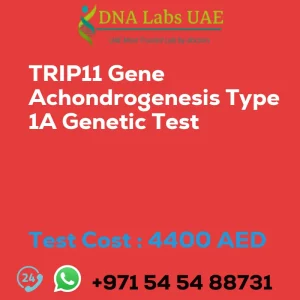PLEKHM1 Gene Osteopetrosis Autosomal Recessive Type 6 Genetic Test
Components
Price: 4400.0 AED
Sample Condition
Blood or Extracted DNA or One drop Blood on FTA Card
Report Delivery
3 to 4 Weeks
Method
NGS Technology
Test Type
Osteology Dermatology Immunology Disorders
Doctor
Dermatologist
Test Department
Genetics
Pre Test Information
Clinical History of Patient who is going for PLEKHM1 Gene Osteopetrosis, autosomal recessive type 6 NGS Genetic DNA Test. A Genetic Counselling session to draw a pedigree chart of family members affected with PLEKHM1 Gene Osteopetrosis, autosomal recessive type 6 NGS Genetic DNA Test gene PLEKHM1
Test Details
The PLEKHM1 gene is associated with a rare genetic disorder called osteopetrosis, autosomal recessive type 6. Osteopetrosis is a condition characterized by increased bone density and brittle bones, leading to an increased risk of fractures and other complications. NGS (Next-Generation Sequencing) genetic testing is a type of genetic testing that allows for the simultaneous analysis of multiple genes, including the PLEKHM1 gene. This type of testing can identify mutations or variations in the PLEKHM1 gene that may be associated with osteopetrosis type 6.
The NGS genetic test for osteopetrosis, autosomal recessive type 6 involves collecting a DNA sample, typically through a blood sample or a saliva sample. The DNA is then analyzed using NGS technology to identify any mutations or variations in the PLEKHM1 gene. The results of the test can help confirm a diagnosis of osteopetrosis, autosomal recessive type 6 and provide information about the specific genetic variant present. This information can be useful for genetic counseling, family planning, and potentially guiding treatment options.
It’s important to note that genetic testing for osteopetrosis, autosomal recessive type 6 is typically only recommended for individuals with symptoms consistent with the condition or those with a family history of the disorder. Genetic testing should be performed and interpreted by a qualified healthcare professional or genetic counselor.
| Test Name | PLEKHM1 Gene Osteopetrosis autosomal recessive type 6 Genetic Test |
|---|---|
| Components | |
| Price | 4400.0 AED |
| Sample Condition | Blood or Extracted DNA or One drop Blood on FTA Card |
| Report Delivery | 3 to 4 Weeks |
| Method | NGS Technology |
| Test type | Osteology Dermatology Immunology Disorders |
| Doctor | Dermatologist |
| Test Department: | Genetics |
| Pre Test Information | Clinical History of Patient who is going for PLEKHM1 Gene Osteopetrosis, autosomal recessive type 6 NGS Genetic DNA Test. A Genetic Counselling session to draw a pedigree chart of family members affected with PLEKHM1 Gene Osteopetrosis, autosomal recessive type 6 NGS Genetic DNA Test gene PLEKHM1 |
| Test Details |
The PLEKHM1 gene is associated with a rare genetic disorder called osteopetrosis, autosomal recessive type 6. Osteopetrosis is a condition characterized by increased bone density and brittle bones, leading to an increased risk of fractures and other complications. NGS (Next-Generation Sequencing) genetic testing is a type of genetic testing that allows for the simultaneous analysis of multiple genes, including the PLEKHM1 gene. This type of testing can identify mutations or variations in the PLEKHM1 gene that may be associated with osteopetrosis type 6. The NGS genetic test for osteopetrosis, autosomal recessive type 6 involves collecting a DNA sample, typically through a blood sample or a saliva sample. The DNA is then analyzed using NGS technology to identify any mutations or variations in the PLEKHM1 gene. The results of the test can help confirm a diagnosis of osteopetrosis, autosomal recessive type 6 and provide information about the specific genetic variant present. This information can be useful for genetic counseling, family planning, and potentially guiding treatment options. It’s important to note that genetic testing for osteopetrosis, autosomal recessive type 6 is typically only recommended for individuals with symptoms consistent with the condition or those with a family history of the disorder. Genetic testing should be performed and interpreted by a qualified healthcare professional or genetic counselor. |








